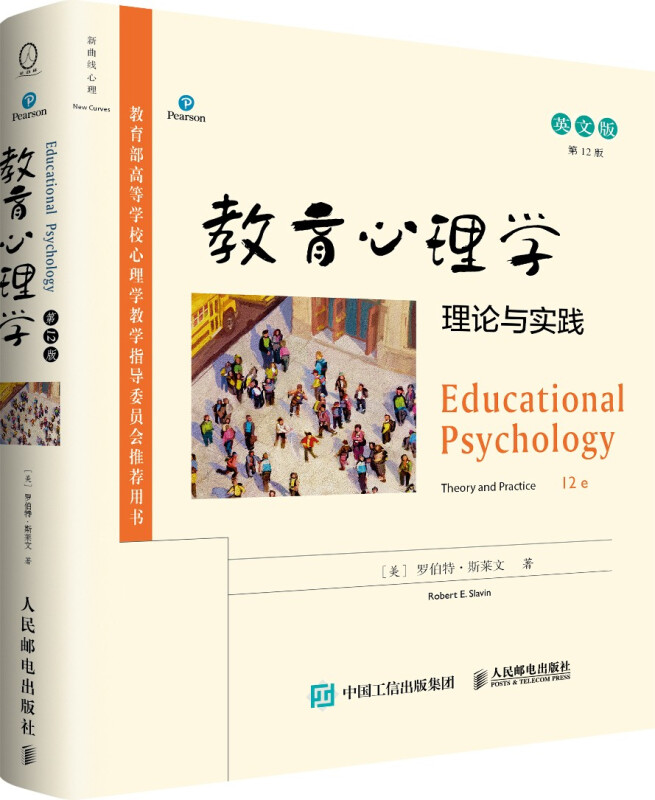
教育心理学:理论与实践:theory and practice:英文版

- ISBN:9787115567178
- 装帧:一般胶版纸
- 册数:暂无
- 重量:暂无
- 开本:26cm
- 页数:28,527页
- 出版时间:2022-05-01
- 条形码:9787115567178 ; 978-7-115-56717-8
本书特色
罗伯特·斯莱文的《教育心理学:理论与实践》在内容体系的构架、事例的科学性、实用性以及可读性等方面堪称典范,是一部经受时间检验又与时俱进的优质教材。 中国心理学界泰斗张厚粲教授、中国心理学会教育心理学专业委员会委员陈英和教授倾力推荐。 作者罗伯特·斯莱文是美国约翰·霍普金斯大学终身教授、教育研究与改革中心主任,也是“让所有人都成功”基金会主席,曾多次荣获美国教育研究会和国家教育委员会颁发的重要奖项,本书是作者数十年教学经验和研究成果的结晶。 《教育心理学:理论与实践》(第12版,英文版)秉承“理论知识与实用策略并举、多元教学理念与方法并存”的宗旨,既有学术专著的科学性和严谨性,又具有实用性。它通过大量的真实案例将理论与实践明确地联系起来,帮助教师把教育心理学中学到的知识迁移到自己的教学中去,成长为一名“有意识的教师”。 《教育心理学:理论与实践》(第12版,英文版)具有极强的可读性,写作风格让你在阅读它时有身临其境的感觉,似乎能听到学生的话语,闻到学校食堂午餐的香味。 第12版对全书进行了修订,增补了新实例,精炼了语言,删除了过时的或无关紧要的内容,全书引用文献多达 2000 余篇,其中 75% 出自 2000 年之后,反映了教育心理学和教育实践领域已经发生的大量变化。
内容简介
《教育心理学 :理论与实践》(第 12 版,英文版)由美国著名教育心理学家、 约翰·霍普金斯大学的罗伯特·斯莱文教授撰写,是一部经典的教育心理学教科书,为明日之教师提供必要的基础知识和实用策略,使之成为有效的教育者。 与市场上那些只讲述大量研究、冗长晦涩的教科书和缺乏科学性的肤浅教科书不同,这本教科书兼具科学性和实用性,介绍了教育心理学领域内的主要理论、基本概念、基本规律与方法,通过大量的真实案例将理论与实践明确地联系起来,教会读者如何将教育心理学的理论知识迁移到现实的课堂教学中,成长为一名“有意识的教师”。作者秉承了理论知识与实用策略并举、多元教学理念与方法并存的特色,每一章都以一幕场景开始,阐释该章强调的实践问题,之后的“理论应用于实践”和“有意识的教师”专栏则提供了进一步的具体策略,以供教师用来改善学生的学习。 本书具有极强的可读性,在写作上,作者努力做到让读者在阅读时有身临其 境的感觉,似乎能听到学生的话语,闻到学校食堂午餐的香味。 近年来,教育心理学和教育实践领域已经发生了大量变化,为了反映这些变 化,第 12 版对全书进行了修订,增补了新实例,精炼了语言,删除了过时的或 无关紧要的内容,全书引用文献多达 2000 余篇,其中 75% 出自 2000 年之后。 本书既可作为高等院校教育心理学课程的教材或参考书,供心理学、教育学专业 的教师、学生及研究者使用,也适合各类教育工作者参考阅读。
目录
CHAPTER ONE
Educational Psychology: A Foundation for Teaching 2
教育心理学:教学的基础
CHAPTER TWO
Cognitive Development 22
认知发展
CHAPTER THREE
Social, Moral, and Emotional Development 44
社会性、道德和情绪发展
CHAPTER FOUR
Student Diversity 64
学生多元化
CHAPTER FIVE
Behavioral and Social Theories of Learning 96
行为与社会学习理论
CHAPTER SIX
Cognitive Theories of Learning 12
认知学习理论
CHAPTER SEVEN
The Effective Lesson 158
有效的教学
CHAPTER EIGHT
Student-Centered and Constructivist Approaches to Instruction 186
以学生为中心与建构主义取向的教学
CHAPTER NINE
Grouping, Differentiation, and Technology 212
分组、差异化教学与技术
CHAPTER TEN
Motivating Students to Learn 246
激发学生的学习动机
CHAPTER ELEVEN
Effective Learning Environments 270
有效的学习环境
CHAPTER TWELVE
Learners with Exceptionalities 300
特殊学习者
CHAPTER THIRTEEN
Assessing Student Learning 338
评估学生的学习
CHAPTER FOURTEEN
Standardized Tests and Accountability 382
标准化测验与问责
节选
THEORY INTO PRACTICE How to Be an Intelligent Consumer of Educational Psychology Research Let’s say you’re in the market for a new car. Before laying out your hard-earned money, you’ll probably review the findings from various consumer research reports. You may want to know something about how various cars have performed in crash tests, which cars have the best gas mileage, or what the trade-in values of particular models are. Before embarking on this major investment, you want to feel as confident as you can about your decision. If you’ve been in this situation before, you probably remember that all of your research helped you make an informed decision. Now that you are about to enter the profession of teaching, you should apply a similar consumer orientation in your decision making (Andrews, 2014; Fleischman, 2014). As a teacher, you will be called on to make hundreds of decisions each day. Your carbuying decision is influenced by a combination of sound research findings and common sense, and your decisions about teaching and learning should follow this same pattern. Teaching and learning are complex concepts subject to a wide variety of influences, so your knowledge of relevant research will serve to guide you in making informed choices. How can knowing the simple formula research + common sense = effective teaching help you to be a more intelligent consumer of educational psychology research? The following recommendations show how you can put this formula into practice: 1. Be a consumer of relevant research. It’s obvious you can’t apply what you don’t know. As a professional, you should maintain a working knowledge of relevant research. In addition to your course texts, which will be excellent resources for you in the future, you should become familiar with the professional journals in your field. Teacher-oriented journals such as Educational Leadership and Phi Delta Kappan contain easy-to-read summaries of research, for example. Websites such as bestevidence.org summarize program evaluations in a user-friendly way. In addition, check out Annual Editions: Educational Psychology, a yearly publication that reprints articles from various professional journals. Don’t overlook the value of networking with other teachers, face to face or via the Internet. The example of Ellen Mathis and Leah Washington is an excellent illustration of how collaboration can expand your knowledge of what works. 2. Teach intentionally. As stated earlier in this chapter, there is no recipe for the ingredients that make up a commonsense approach to teaching. However, behaviors consistent with being an intentional teacher are about as close as we can get. Intentional teachers are thoughtful. Like Mr. Harris, you should consider multiple perspectives on classroom situations. When you take action, be purposeful and think about why you do what you do. Like other intentional teachers, you can follow your actions with careful reflection, evaluating whether your actions have resulted in the desired outcomes. You probably learned about the “scientific method” sometime during high school. Intentional teachers employ such a method in teaching, formulating a working hypothesis based on observations and background knowledge, collecting data to test the hypothesis, effectively organizing and analyzing the data, drawing sound conclusions based on the data, and taking a course of action based on the conclusions. For many experienced teachers, this cycle becomes automatic and internalized. When applied systematically, these practices can serve to validate research and theory and, as a result, increase your growing professional knowledge base (Schoenfeld, 2014). 3. Share your experiences. When you combine knowledge of research with your professional common sense, you will find yourself engaged in more effective practices. As you and your students experience success, share your findings. Avenues for dissemination are endless. In addition to publishing articles in traditional sources such as professional journals and organizational newsletters, don’t overlook the importance of preparing schoolwide in-service demonstrations, papers for state and national professional conferences, and presentations to school boards. In addition, the Internet offers various newsgroups where teachers engage in ongoing discussions about their work.
作者简介
罗伯特·斯莱文(Robert E. Slavin)是美国约翰·霍普金斯大学教育研究与改革中心主任,也是“让所有人都成功”基金会主席。他于1975 年在约翰·霍普金斯大学获社会关系学博士学位,迄今撰写了300 余篇关于合作学习、综合学校改革、能力分组、学校和班级组织、废除种族歧视、纳入主流、研究评论以及循证改革等方面的论文和书籍章节。斯莱文博士的著作(包括与他人合著)多达20 部,包括《合作学习》《学校和班级组织》《针对高危学生的有效方案》《预防早期的学业失败》《200万儿童:让所有人都成功》《拉丁裔学生的有效项目》《问责制时代的教育研究》。1985 年,斯莱文博士因应用项目研究而荣获了美国教育研究会(AERA)颁发的雷蒙德·卡特尔早期职业奖;1988 年,他在美国教育研究会主办的学术期刊上获得了帕尔默·约翰逊优秀论文奖;1994 年获得查尔斯·达纳奖,1998 年获得美国国家教育委员会颁发的詹姆斯·布赖恩特·科南特奖,2000 年获得州首席教育官员联合会颁发的杰出贡献奖;2008年他在美国教育研究会主办的杂志上再次获得帕尔默·约翰逊优秀论文奖,2009 年获得AERA 研究综述奖,2010年成为AERA会员。
-

饥饿、富裕与道德
¥11.3¥45.0 -

偏见
¥17.9¥56.0 -

世界尽头的咖啡馆
¥25.2¥45.0 -

咬文嚼字二百问
¥14.9¥32.0 -

女性生存战争
¥19.8¥66.0 -

乌合之众:群体心理研究
¥11.9¥39.8 -

从白大褂到病号服:探索医疗中的人性落差
¥12.7¥39.8 -

汉字王国
¥11.5¥46.0 -

乡土中国
¥12.2¥26.0 -

性心理学
¥26.1¥58.0 -

自卑与超越
¥12.7¥39.8 -

万物皆无序
¥23.4¥42.0 -

身为女性的选择
¥30.4¥56.0 -

语文闲谈
¥10.4¥29.0 -

乌合之众:大众心理研究
¥16.6¥36.8 -

理解人性
¥11.9¥39.8 -

我们内心的冲突
¥16.5¥55.0 -

非暴力沟通心理学 : 用非暴力沟通化解冲突
¥9.0¥36.0 -

健康鸿沟:来自不平等世界的挑战
¥26.2¥55.0 -

中国人的名·字·号
¥9.0¥28.0










